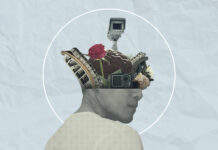“There’s a crack in everything. That’s how the light gets in.” – Leonard Cohen
The word disability gets tossed around a lot at the NARPA conference, and when discussing mental health law and advocacy. Despite this potential contradiction of my previous article, since it looks like our movement is far from ditching the word entirely, I think it is time to reclaim the word disability. Disability needs to be appreciated. To the extent we value community over isolation, anything anyone cannot do, or needs help with, builds community. In a society that truly values community, anything that would be labeled a mental illness in our culture would be seen as a community building opportunity, a situation ripe for fostering connection.
When everything is going along fine and everyone is “functioning” “efficiently” in their cubicles, what is there to connect on? Who needs community? When there is a problem, disability, or lack of ordinary functioning of any kind, community is needed and therefore built. True connections are made based on need.
Having a family life that overwhelmed me as a child caused me to need to rely on friends. I became very good at creating friendships and fostering community because I needed to — because I was “broken” and in a “dysfunctional” family. If I had not developed powerful friendships I would have likely become suicidal; but instead my disability and deficit (having a torturous family life) led to stronger connections with friends. I experience that making and developing friendships is still one of my strongest points and others tell me this, too. It’s because I am disabled without others.
(Top secret: we all are.)
Relating with others is as much about what we can’t do as what we can, for anything one person can’t do gives another person a reason for existing! If I need someone to talk to, someone who cares to listen has a reason to be alive. If someone else needs someone to talk to and I can be that for them, I have a purpose. I can fill a need. A disability is basically an unfilled need, waiting to be filled. Feeling a lack of purpose in life can easily translate into a DSM diagnosis, therefore, we are all disabled individuals until our needs are matched with those who can meet them and others needs are matched with something we can do to help.
This feels a bit contrary to my last article, “Are You Abled or Disabled? How do you Know?” which roots on the premise that Americans see disability as a negative (and we generally do). But we don’t always stop to think about the indisputable fact that every single thing we do in life that has any meaning whatsoever is dependent on someone else being disabled in some way. It can be as simple as serving food to people who are too tired at that moment to make their own or protecting someone who is unable to protect themselves or sharing ideas and inspiration with those who feel demoralized. There are infinite examples in every career and walk of life of how necessary “disability” (since we’re calling it that) is for connection, service and meaning in life. Without it we’d have absolutely no need for each other. And the fastest way to despair is to feel unnecessary.
Someone once said to me, “The best things in life have come to me out of desperation.” The most profound connections in my life have resulted from my disabilities. They have come especially from those times where I would have easily been labeled mentally ill by psychiatry if I had not found meaningful connection in its place. The most important relationships heal those parts of myself that would feel broken and lost without them. The schizophrenic, multiple personality, bipolar, dissociative identified, post traumatic stress and anxiety ridden person is none of those things with the right people around them to fill in the gaps with love and humor.
This is what makes life romantic — being unable to do everything alone or heal ourselves in isolation — and the love that comes to every single person who is willing to be “disabled,” “imperfect,” “broken,’ “dysfunctional” or otherwise in need of companionship and caring.














I could not help but think of a favorite line from a favorite poem as I read this…seeming contradiction is something I’m very familiar with:
“Do I contradict myself? Very well, then I contradict myself, I am large, I contain multitudes.” – Walt Whitman
I think anyone who grapples deeply with the nature of reality finds that this is true…seeming contradictions existing simultaneously…or also, paradox being at the root of all things.
I’ve put that poem on Beyond Meds more than once. This is the whole thing: http://wp.me/p5nnb-7XM
thanks Chaya…
Report comment
Thanks Monica!!
Report comment